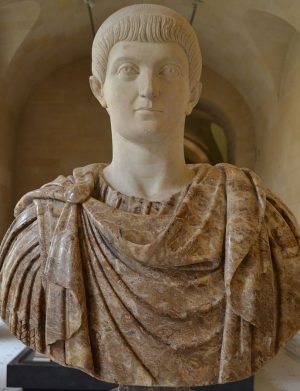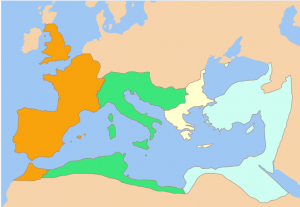| Constans | |
|---|---|
 | |
| Roman Emperor | |
| In Power | Sep 9, 337 – Jan 18,350 |
| Born | c. 320 |
| Died | Jan 350 (aged 30) Vicus Helena, southwestern Gaul |
| Father | Constantine I |
| Mother | Fausta |
Flavius Julius Constans, or Constans I, was born around 320. He was the youngest son of Constantine I and Fausta. He grew up in Constantinople and learned Latin from the poet and professor Aemilius Arborius. When he was thirteen years old, Constans was declared Caesar, or junior emperor, by his father.
Reign
When his father died in 337, Constans became emperor, along with his brothers, Constantine II and Constantius II. They inherited the territories of the empire, which they had to share with their cousins and junior emperors, Dalmatius and Hannibalianus. However, the brothers had no plans to share the empire with their cousins. Shortly after, Dalmatius was killed by his own troops, while the circumstances surrounding Hannibaluanus’ death are not clear. The two junior emperors were not the only ones to perish in the purge — all of the three brothers’ male cousins died, except two infants. After this, the emperors convened and carved out the empire for themselves. Constans claimed Dalmatius’ territories — Thrace, Macedonia, and North Africa, while Constantine II received Italy, Gaul, Hispania, and Britannia. Lastly, Constantius II took Egypt and the Asian provinces.

Despite the vast domains under his name, Constantine II felt cheated by the territorial division. Being the eldest of the brothers, he felt entitled to more land. Soon, he ordered Constans to turn over Thrace and Macedonia to him. Being under the guardianship of his elder brother and not wanting a war, Constans did as he was told. Later, though, Constantine demanded that Constans hand over portions of North Africa too. The two then argued over specific portions of North Africa, with Constantine II endlessly imposing his domineering stance over his younger brother. But Constans had reached his twentieth year and was now rejecting his brother’s guardianship. Furious at his younger brother’s defiance, Constantine II marched his troops to Italy, bent on taking over the region. Constans was in Dacia during the time, but on hearing the news, sent a portion of his troops to confront his brother’s forces. Constans’ troops were smaller, but they ambushed the much larger force in Aquileia, resulting in Constantine II’s death. After this, Constans added his dead brother’s territories to his own.
With his overbearing brother out of the way, Constans set his sights on the invading Franks. He crushed the Germanic warriors in the years 341 and 342, then followed it up by crossing over the English Channel to ward off either the invading Picts or Scots.
Halfway through his reign, Constans argued with his other brother and co-emperor, Constantius II. Constans had been upholding Christianity, the faith that his father had championed, but his brother, Constantius II, supported the Christian version of Arianism. Arianism had already been declared as heresy in the Nicene Creed of 325, and so, to settle matters, the two emperors agreed to convene in 343 at the Council of Serdica, where 170 bishops participated. The council failed to resolve the conflict, so Constans and Constantine II prepared for war. However, war was avoided in 346 when the two reached a temporary agreement to simply foster their chosen religious doctrine in their respective domains and appoint their own priests.
Constans lost interest in governing his territories in the latter years of his reign. He played favorites with his supporters and entrusted imperial duties to his close friends. Furthermore, he was constantly hounded with rumors of homosexuality. The historian Aurelius Victor mentioned stories where Constans supposedly did shameful acts with “handsome barbarian hostages.” Constans and Contstantius II issued a decree that sought to punish “deviant” marriages, but the historian John Eastburn Boswell believes Constans was simply forced by Christian personages in order to calm rumors about his alleged vices.
Death
The insidious rumors of laziness and homosexuality continued, and in 350, Constans’ unpopularity emboldened a general named Magnentius. With the support of the legions on the Rhine, Magnentius declared himself emperor at Augustulum. Constans was in the Pyrenees hunting wild animals with some of his men when he heard the news. He knew he would not have a chance of fighting due to his unpopularity, so he fled toward Hispania. Magnentius sent his soldiers to hunt down the fleeing Constans, who was now trying to reach a seaport in Hispania. However before he could do so, he was cornered by Magnentius’ troops near Helena, hiding inside a temple. With complete disregard for the house of worship, the troop commander ordered his men to kill Constans right where he was found.
Magnentius’ forces soon swelled, as legions in Gaul, Hispania, and Britannia swung over to his command. He was still a usurper, though, as Constans’ brother, Constantius II, remained on the imperial throne.